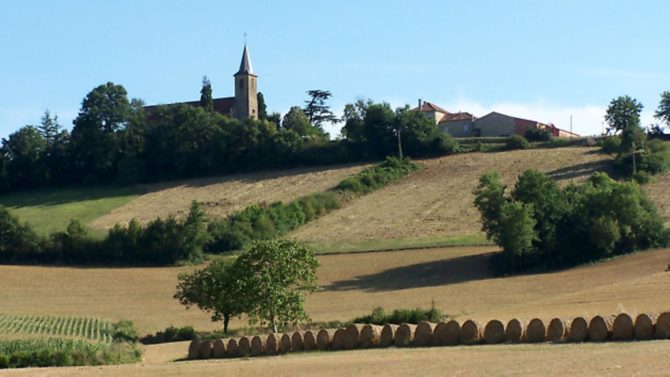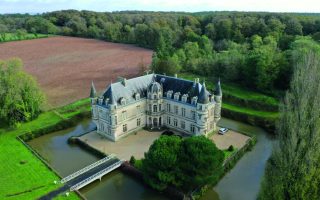Gorgeous Gers

On the hunt for an unsung corner of France, Carolyn Reynier travels to western Gers and discovers some unassuming communes and little-known wines

According to the March 2013 update by INSEE, the French bible for all things statistical, Gers has the lowest population density of the eight departments making up the Midi-Pyrénées region. There are probably more geese and ducks than people. In this article, I explore the undulating western Gers around the small rural towns of Riscle and Plaisance.

WINE ABOUT THE WEST
To the wine aficionados among you, Gers means armagnac, but the rolling hillsides of this little western corner are also home to three distinct wine appellations.
St-Mont, covering 1,200 hectares of the hillsides that overlook the Adour valley, has some of the oldest vines in France, some over 150 years old. It produces reds, rosés and whites from wonderful vines with strange-sounding names including tannat, pinenc, arrufiac and petit courbu.
The ancient Madiran vineyards producing rich tannic reds date back to Gallo-Roman times and are at the crossroads of the three departments. Like the St-Mont wines, they owe their renown to pilgrims on their way to Santiago de Compostela as the Via Tolosa traverses the two vineyards.
Lastly, Pacherenc du Vic-Bilh is a white wine produced from just 300 hectares of vines; wines can be dry, or moelleux (a French term used for wines of mid-level sweetness) when picked late (la vendange tardive). You can taste these wines in producers’ chais and along the wine routes.
These wines are all the perfect accompaniment for the firm favourite goose and duck foie gras, produced by the ancestral agricultural practice of gavage plus all the other delicious derivatives – confit, magret, gésier. Look out, too, for Tarbais and haricot beans, the porc noir Gascon and traditional dishes like poule au pot.
The cultural flagship is the summer ‘Jazz in Marciac’ festival but there are plenty of other fêtes and festivals.
HAPPY CUSTOMERS
I spoke to Julia Grange who moved to France from the Oxford area over five years ago. They decided that Dordogne was “too English” so they simply stuck a pin in the map to see what was just south and ended up in Gers.
They live in the village of Magnan between Riscle and the Landes border and work as estate agents within the Leggett Immobilier network. “There’s not much traffic here and the area is full of friendly people, a relaxed way of life and plenty of cultural events such as art exhibitions, which I hadn’t really expected,” says Julia.
The couple fell in love with the area, mainly due to the wonderful weather and the countryside. “There are gently rolling hills covered with trees, vineyards, sunflowers and maize fields. It’s so very gentle and lush,” she says. They also enjoy the atmosphere and conviviality of the area – especially in the summer when there are festivities in virtually every village. “You could go every weekend in summer from village to village partying if you’re that way inclined,” she adds.
The Granges’ village of Magnan has no shops so the nearest places are Nogaro to the east and Le Houga to the west. Their plan had been to live within walking distance of the boulangerie which is no surprise. Most people say they want to be on the edge of a village so they can walk in to get their bread.
Still, Julia’s advice is to find your perfect house first and leave details like that as a secondary concern. She says she has sent details to clients of houses within baguette-buying distance of villages such as Beaumarchés, near Marciac, but househunters then come back saying they want to be more remote. This frustration is all part and parcel of finding your dream home, of course, but Julia repeats: “It’s a question of finding the house, I think”.
“The western Gers is a great area because you are relatively close to a lot of things,” she adds. “People think it’s in the middle of nowhere but depending on where you are you can get to Toulouse airport in two hours, while Bordeaux airport can take even less than that with the new A65 motorway.”
Tarbes and Pau airports are also fairly near and with the improved roads to Biarritz the couple often fly out of the great little airport there. “You can go to almost any part of the UK from one of these airports,” she says, “and the airline links are fantastic.”
Plus, in two hours you are in the Pyrénées if you enjoy walking and skiing, and in summer it is just an hour and a half to the famous Capbreton beaches on the Atlantic coast.
PROPERTY MARKET
The local property market is currently quite dynamic. Mirande is the cheapest sector of Gers and owners are finally listening to estate agents, pricing their properties at market values and as a result they are selling. Prices peaked in 2006-2007 and are now returning to the reasonable prices of 10 years ago; and agents report that the number of transactions is increasing.
I spoke to Stéphane Bertoletti who has estate agencies in Riscle, Plaisance and Marciac. He told me that prices in northern Gers remain firm due to this area being armagnac country and thus greatly sought after. Property in eastern Gers around Auch and heading towards Toulouse is expensive because of the associated economic activity. In south-western Gers the jazz festival pushes up Marciac values. “Prices can be 20% higher than Plaisance which is only 15 kilometres further north,” says Bertoletti.
The canny buyer should consider buying in the west of the department where you can enjoy the Gers quality of life and pay €100,000 less for their home than, say, around Eauze or Condom, where you will be paying for la notoriété and le prestige of the armagnac areas.
“You can find some beautiful properties from €200,000,” says Bertoletti who recently sold a property at that price with a hectare of land. “Everybody wants houses for €100,000 but the market really opens up here for those who can stretch to €200,000.”
His clients are primarily buying main homes because today they can’t afford to buy a holiday home. Often they are reaching retirement age, sell their home in another sector, and with the difference they buy a motor home and have money left over to enjoy a better quality of life, he says.
In terms of architecture, fermettes – small country farmhouses with outbuildings and some land – are most popular. These are generally L-shaped or, because this is wine country, they may have chais (wine storehouses) at the rear.
Also popular is the traditional Gascon-style house, typical of the region. Dating from the late 1880s, these stone properties are arranged with four rooms off a main corridor on the ground and first floor. You can expect to pay around €300,000 for a 200m² maison gasconne with pool and a hectare of land.
Many of the old walls and buildings used for housing livestock are built with galets (large river-rounded pebbles extracted from the Adour, the result of glacial erosion of the nearby Pyrénées) and properties too are often built with these ubiquitous stones. You will also see a lot of colombage, the typical half-timbering found in the neighbouring Landes department.
To give an idea of price Mr Bertoletti quotes €50,000 for a fermette which needs renovation with a couple of hectares. He recently sold a three-bedroom country house near Riscle which benefited from a new roof, an attic to be converted and lovely open views for €110,000.
The area is now very accessible with the Aire-sur-l’Adour junction of the Pau-Bordeaux motorway just 15km from Riscle. “For us Pau is the most important town in the sector,” he says. Some wonderful areas of Gers are often overlooked, he explains, because of the more famous areas around Marciac (because of the jazz) and Gimont and L’Isle-Jourdain, which are close to Toulouse and economically stronger. However, if you would rather be in a quiet agricultural community, the communes in the west are perfect.
“We are deep in the countryside so we are in a good situation,” he says. “Prices are affordable and with the car you can easily go to the Pyrénées or the ocean for the day.”
BUILDING THE DREAM
Kevin and Katherine Franklin have recently moved to Gers
Last December, Kevin Franklin and his wife paid under €300,000 for a two-hundred-year-old four-bedroom property east of Plaisance and north of Marciac in Gazax-et-Baccarisse – worth buying just for the unusual name.
Katherine retired last year from the NHS and although Kevin still works they decided that if they didn’t move out to France now, while in their mid-fifities, but left it another 10 years, they would never do it. They have spent the last five or six years coming out to France and have stayed with friends living near Condom in northern Gers. They also have friends in Italy in Le Marche and, as Kevin says, wanted to “replicate an area that was similar to that – rolling hills, sunflowers, that sort of thing.” Kevin does most of his work advising local authorities via the internet but occasionally has to fly back to the UK, using Toulouse or Bordeaux airports.
The couple had a survey carried out on the property, which had already been renovated, but although they were expecting to carry out some work this has turned out to be more extensive than anticipated. “We’re having to spend quite a bit of money on heating and basic stuff so on a lovely sunny morning like this morning it’s absolutely wonderful; on a cold snowy morning in the middle of January maybe not so much. We’re just hoping for the better weather really!”
Still, by the time you read this the builders should have finished.
As Kevin says, people fall into different camps – those who want to renovate the entire property, those who expect to do some work and those who want to buy a finished product. If you want to do the latter, he suggests that you shoud spend a bit of time investigating the renovation that has gone on.
Their property has three attached barns and almost two hectares of land, with an area of paddock boasting various trees including three different types of cherry and walnuts. “I think it will be lovely,” Kevin says, “it just needs some work. It’s the scale of it. When you think your little lawnmower is not going to do this, you need something a little bit more industrial.” But he will be able to cool off in the pool when that is installed. “One of the main reasons for coming out, to be perfectly honest, is the weather. We feel we’ve had 10 years of rain in Devon.”
The previous owner ran a chambres d’hôtes at the property and Katherine has plans to do that, particularly during the Jazz in Marciac festival. But not this summer; they have too many friends and family coming out to stay.
Initially, they believed they were moving to an area where there was not a big expat community and have been surprised at how many British people are here.
“You go into the supermarket in Marciac and you see British number plates there and hear English accents,” says Kevin. As they do not speak a lot of French (Katherine speaks more Spanish and they can be with friends in northern Spain in a couple of hours) “it is a comfort just in case we do get stuck,” they say.
Share to: Facebook Twitter LinkedIn Email


